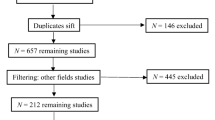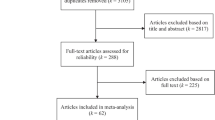Abstract
It is argued that problem video game use (PVGU) has similarities with behavioral addictions such as problem gambling. Unlike other addictions, the predictors of online PVGU have not been studied extensively. We applied a stress-coping model, previously developed for electronic gambling addiction, to PVGU. In this model, stressors lead to excessive behavior via maladaptive coping strategies involving the behavior. Video game players (N = 2261) completed an online questionnaire about their gaming habits, and self-report measures of depression, loneliness, social anxiety, and escapism and social interaction motives for gaming. Consistent with the stress-coping model, depression, loneliness, and social anxiety predicted levels of PVGU, these effects being partially mediated by escapism and social interaction motives for gaming. The pattern of mediation differed by gamers’ preferred game genre in a way that suggested “First Person Shooter” games provide an escape from aversive states, while, in addition to providing escape, massively multiplayer online role playing games, which emphasize collaborative play, may also be supplementing or substituting for face-to-face social interactions.



Similar content being viewed by others
References
Amichai-Hamburger, Y., Wainapel, G., & Fox, S. (2002). “On the internet no one knows I’m an introvert”: extroversion, neuroticism, and internet interaction. Cyberpsychology and Behavior, 5(2), 125–128.
Cole, H., & Griffiths, M. D. (2007). Social interactions in massively multiplayer online role-playing gamers. Cyberpsychology and Behavior, 10(4), 575–584. https://doi.org/10.1089/cpb.2007.9988.
Compas, B. E., Connor-Smith, J. K., Saltzman, H., Thomsen, A. H., & Wadsworth, M. E. (2001). Coping with stress during childhood and adolescence: problems, progress, and potential in theory and research. Psychological Bulletin, 127(1), 87–127. https://doi.org/10.1037//0033-2909.127.1.87.
Cooper, M. L., Russell, M., Skinner, J. B., Frone, M. R., & Mudar, P. (1992). Stress and alcohol use: moderating effects of gender, coping, and alcohol expectancies. Journal of Abnormal Psychology, 101(1), 139–152.
Cooper, M. L., Frone, M. R., Russell, M., & Mudar, P. (1995). Drinking to regulate positive and negative emotions: a motivational model of alcohol use. Journal of Personality and Social Psychology, 69(5), 990–1005.
Fritz, M. S., & MacKinnon, D. P. (2007). Required sample size to detect the mediated effect. Psychological Science, 18(3), 233–239. https://doi.org/10.1111/j.1467-9280.2007.01882.x.
Frostling-Henningsson, M. (2009). First-person shooter games as a way of connecting to people: “brothers in blood”. Cyberpsychology and Behavior, 12(5), 557–562. https://doi.org/10.1089/cpb.2008.0345.
Gentile, D., Choo, H., Liau, A., Sim, T., Li, D., Fung, D., & Khoo, A. (2011). Pathological video game use among youths: a two-year longitudinal study. Pediatrics, 127(2), e319–e329. https://doi.org/10.1542/peds.2010-1353.
Griffiths, M. (2010). The role of context in online gaming excess and addiction: some case study evidence. International Journal of Mental Health and Addiction, 8(1), 119–125. https://doi.org/10.1007/s11469-009-9229-x.
Hayes, A. F. (2013). Introduction to mediation, moderation, and conditional process analysis: a regression-based approach. New York, NY: Guilford Press.
Hsu, S. H., Wen, M. H., & Wu, M. C. (2009). Exploring user experiences as predictors of MMORPG addiction. Computers and Education, 53(3), 990–999. https://doi.org/10.1016/j.compedu.2009.05.016.
Hussain, Z., & Griffiths, M. D. (2009). Excessive use of massively multi-player online role-playing games: a pilot study. International Journal of Mental Health and Addiction, 7(4), 563–571. https://doi.org/10.1007/s11469-009-9202-8.
Johnston, L., Titov, N., Andrews, G., Spence, J., & Dear, B. F. (2011). A RCT of a transdiagnostic internet-delivered treatment for three anxiety disorders: examination of support roles and disorder-specific outcomes. PLoS One, 6(11), e28079.
King, D. L., Delfabbro, P. H., & Griffiths, M. D. (2010). Recent innovations in video game addiction research and theory. Global Media Journal - Australian Edition, 4(1), 1–14.
King, D., Delfabbro, P., & Zajac, I. (2011). Preliminary validation of a new clinical tool for identifying problem video game playing. International Journal of Mental Health and Addiction, 9(1), 72–87. https://doi.org/10.1007/s11469-009-9254-9.
King, D. L., Haagsma, M. C., Delfabbro, P. H., Gradisar, M., & Griffiths, M. D. (2013). Toward a consensus definition of pathological video-gaming: a systematic review of psychometric assessment tools. Clinical Psychology Review, 33(3), 331–342.
Lazarus, R. S., & Folkman, S. (1984). Stress, coping and appraisal. New York, NY: Springer.
Lo, S., Wang, C., & Fang, W. (2005). Physical interpersonal relationships and social anxiety among online game players. Cyberpsychology and Behavior, 8(1), 15–21.
Lovibond, P. F., & Lovibond, S. H. (1995). The structure of negative emotional states: scales (DASS) with the Beck Depression and Anxiety Inventories. Behavior Research and Therapy, 33(3), 335–343.
McKenna, K., & Bargh, J. (1999). Causes and consequences of social interaction on the Internet: a conceptual framework. Media Psychology, 1(3), 249–269.
Mentzoni, R., Brunborg, G., Molde, H., Myrseth, H., Skouveroe, K., Hetland, J., & Pallesen, S. (2011). Problematic video game use: estimated prevalence and associations with mental and physical health. Cyberpsychology, Behavior and Social Networking, 14(10), 591–596. https://doi.org/10.1089/cyber.2010.0260.
Ng, B. D., & Wiemer-Hastings, P. (2005). Addiction to the internet and online gaming. Cyberpsychology and Behavior, 8(2), 110–114. https://doi.org/10.1089/cpb.2005.8.110.
Peters, C. S., & Malesky, L. A. (2008). Problematic usage among highly-engaged players of massively multiplayer online role playing games. Cyberpsychology and Behavior, 11(4), 481–484. https://doi.org/10.1089/cpb.2007.0140.
Peters, L., Sunderland, M., Andrews, G., Rapee, R. M., & Mattick, R. P. (2012). Development of a short form Social Interaction Anxiety (SIAS) and Social Phobia Scale (SPS) using nonparametric item response theory: The SIAS-6 and the SPS-6. Psychological Assessment, 24(1), 66–76. https://doi.org/10.1037/a0024544.
Russell, D. W. (1996). UCLA Loneliness Scale (Version 3): reliability, validity, and factor structure. Journal of Personality Assessment, 66(1), 20–40.
Shen, C., & Williams, D. (2011). Unpacking time online: connecting internet and massively multiplayer online game use with psychosocial well-being. Communication Research, 38(1), 123–149. https://doi.org/10.1177/0093650210377196.
Sherry, J.L., Lucas, K., Greenberg, B.S., & Lachlan, K. (2006). Video game uses and gratifications as predictors of use and game preference. In Playing video games: Motives, responses, and consequences, 213–224. Retrieved from http://icagames.comm.msu.edu/vgu%26g.pdf
Thomas, A. C., Sullivan, G. B., & Allen, F. C. L. (2009). A theoretical model of EGM problem gambling: more than a cognitive escape. International Journal of Mental Health and Addiction, 7(1), 97–107. https://doi.org/10.1007/s11469-008-9152-6.
Thomas, A. C., Allen, F. L., Phillips, J., & Karantzas, G. (2011). Gaming machine addiction: the role of avoidance, accessibility and social support. Psychology of Addictive Behaviors, 25(4), 738–744. https://doi.org/10.1037/a0024865.
Wan, C., & Chiou, W. (2006). Why are adolescents addicted to online gaming? An interview study in Taiwan. Cyberpsychology and Behavior, 9(6), 762–767 Retrieved from http://online.liebertpub.com/doi/pdf/10.1089/cpb.2006.9.762.
Whang, L. S. M., Lee, S., & Chang, G. (2003). Internet over-users’ psychological profiles: a behaviour sampling analysis on internet addiction. Cyberpsychology and Behavior, 6(2), 143–150. https://doi.org/10.1089/109493103321640338.
Wood, R. T., Griffiths, M. D., Chappell, D., & Davies, M. N. O. (2004). The structural characteristics of video games: a psycho-structural analysis. Cyberpsychology and Behavior: The impact of the Internet, Multimedia and Virtual Reality on Behavior and Society, 7(1), 1–10. https://doi.org/10.1089/109493104322820057.
Xu, Y., Cao, X., Sellen, A., Herbrich, R., & Graepel, T. (2011). Sociable killers: understanding social relationships in an online first-person shooter game. In Proceedings of the ACM 2011 conference on Computer supported cooperative work (pp. 197–206). ACM.
Yee, N. (2006). Motivations for play in online games. Cyberpsychology and Behaviour: The Impact of the Internet, Multimedia and Virtual Reality on Behavior and Society, 9(6), 772–775. https://doi.org/10.1089/cpb.2006.9.772.
Young, K. S. (2009). Understanding online gaming addiction and treatment issues for adolescents. The American Journal of Family Therapy, 37(5), 355–372. https://doi.org/10.1080/0192618090294219.
Author information
Authors and Affiliations
Corresponding author
Ethics declarations
Conflict of Interest
The authors declare that they have no conflict of interest.
Informed Consent
All procedures followed were in accordance with the ethical standards of the responsible committee on human experimentation (institutional and national) and with the Helsinki Declaration of 1975, as revised in 2000 (5). Informed consent was obtained from all participants for being included in the study.
Rights and permissions
About this article
Cite this article
Maroney, N., Williams, B.J., Thomas, A. et al. A Stress-Coping Model of Problem Online Video Game Use. Int J Ment Health Addiction 17, 845–858 (2019). https://doi.org/10.1007/s11469-018-9887-7
Published:
Issue Date:
DOI: https://doi.org/10.1007/s11469-018-9887-7




